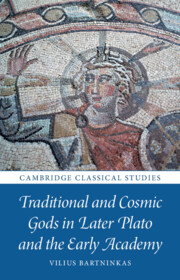Refine search
Actions for selected content:
2 results
Introduction
-
- Book:
- Traditional and Cosmic Gods in Later Plato and the Early Academy
- Published online:
- 06 April 2023
- Print publication:
- 13 April 2023, pp 1-27
-
- Chapter
-
- You have access
- Open access
- HTML
- Export citation

Traditional and Cosmic Gods in Later Plato and the Early Academy
-
- Published online:
- 06 April 2023
- Print publication:
- 13 April 2023
-
- Book
-
- You have access
- Open access
- Export citation
